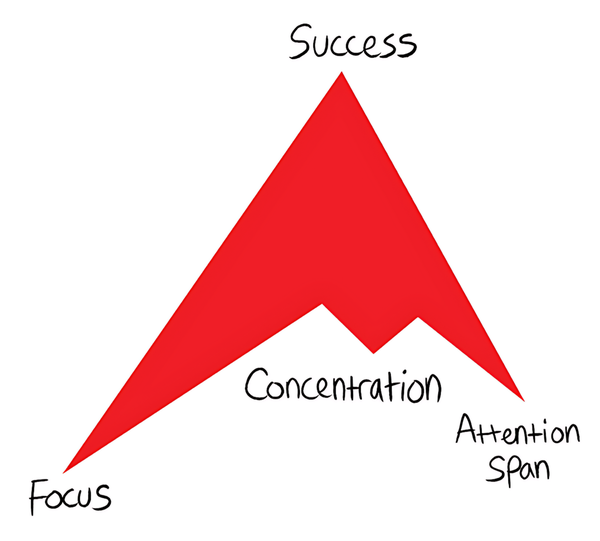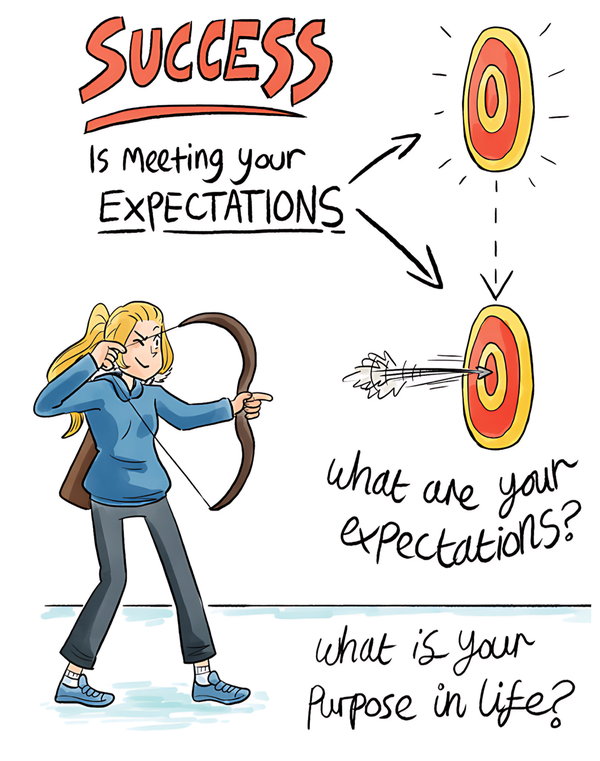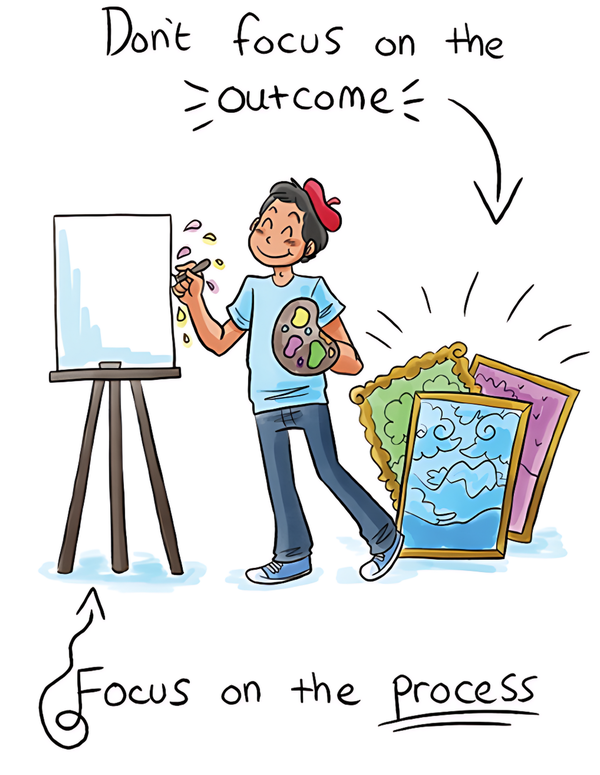How to Improve Your Focus and Concentration
Jun 12, 2023 by Vreny Blanco · 7 min read · Focus

In this blog post, I will provide practical strategies to strengthen your focus, maximize efficiency, and achieve your dreams.
Get ready to shine!
Focus, Concentration, and Attention Span
Successful people have high levels of focus and concentration.1 In simple terms, focus is the ability to direct your attention to a single task. Concentration is the ability to maintain your attention on that task, and attention span refers to how long you can stay focused without being distracted.2
By cultivating and mastering these three fundamental elements that drive performance, you will lay the foundation for your personal and professional success.

How to Increase Focus and Concentration: 11 Simple Hacks
Are you ready to reach your goals and achieve the highest level of success? Improving your focus can significantly increase your productivity and help you achieve your life’s purpose.
Let’s explore how you can boost your concentration and make the most of your time:
1. Define Your Goals
Successful people know exactly what they want and devote their full attention to achieving it. Lack of clarity is the number one cause of failure at work and in personal life.1
One of the most important things you can do to increase your focus is to gain clarity about the following:
What do you want to accomplish and why?
Define your goals. Ensure they align with your personality and values and genuinely excite you.1
What do you need to do?
- Ask yourself: If I keep doing what I am doing today, will I achieve this goal? What do I need to change? Write it down.1
- Set SMART goals: specific, measurable, achievable, relevant, and time-bound.
- Clearly define the steps you will take to achieve your goals.
- Break tasks into smaller, actionable steps.3 4
- Research who has achieved a similar goal and what resources are available.
What is the most effective way to achieve your goals?
- The Pareto Principle, commonly known as the 80/20 rule, suggests that 20% of your efforts will produce 80% of the results. This method can help you identify your priorities and pinpoint the tasks that need your attention. 1 5 6
- Develop a specific strategy.
- You should decide the most effective steps to follow based on your situation, the resources available (time, money), and your personality.1
Remember, you can only achieve a goal if you know the exact steps you need to take to get there.1

2. Create a Productive Environment
- Designate a specific area to work that is free of clutter and potential interruptions.
- Ensure proper lighting, comfortable temperature, and an organized setup that supports your workflow.
- A clean, distraction-free environment helps you focus.
- Your workspace should be unique and personalized. Find out what helps you focus and create that space for you.4
3. Eliminate Distractions
Eliminate all possible distractions before you begin to work. Examples of typical distractions include:
- Social media notifications
- Phone calls
- Questions from coworkers
- General noise
- Disorganized workspace
Mute or turn off your phone, close unnecessary browser windows, and set boundaries with coworkers or family members to minimize interruptions.
Block Digital Distractions
- Use an app and website blocker like 1Focus to block distracting and time-consuming content (block social media, block YouTube, Netflix, games, texting, email, etc.).
- Block websites and apps during working hours.
- Block all websites except the specific ones you need for work or study, to ensure monotasking.
- Block the internet by blocking the App Store and installed web browsers.
4. Learn to Say No
- Time is one of your most precious assets, and nobody is entitled to it but you.
- Learning to say no is a sign of self-respect. It means you respect yourself enough to focus on things that truly matter to you while saying no to less important activities.1
5. Create a Morning Routine
- Establish a pre-work routine that signals your brain that it’s time to focus.
- Do a short meditation or a breathing exercise, write down your thoughts, or review your goals for the day.
- Start with your most complicated/important task.
6. Focus on One Thing
- Get into the habit of focusing on one task at a time without distractions. This will help you concentrate and produce higher quality work.
- With sustained attention, the quality of your work will be better, you will have more creativity, and you will be more intuitive.2
7. Prioritize and Manage Your Time
- Plan your day by designating specific blocks of time for different tasks or activities. During these periods, eliminate distractions and focus exclusively on one task.
- Creating blocks of time will help you build a structured routine, increase your efficiency and reduce decision fatigue.
- Pay attention to your energy levels throughout the day.
- Prioritize deep work sessions during your most productive hours. When do you have the most energy – in the morning or evening?4
- Perform challenging or essential tasks during your peak productivity periods and less demanding tasks when your energy naturally wanes.4
- A popular time-management technique is the Pomodoro technique, in which you focus on a task for 25 minutes, then take a short 5-minute break. Or work for 90 minutes followed by a 15- to 20-minute break.3 4
8. Take Short Breaks
- Incorporate short breaks into your work routine to recharge and prevent mental fatigue.
- Engage in activities that relax your mind, such as stretching, deep breathing, or taking a short walk.
9. Self-Care
- A healthy body and mind provide a solid foundation for staying focused and productive.
- Prioritize self-care activities such as exercise and a balanced diet.
- Exercise can improve your concentration and boost your memory.4
10. Get Enough Sleep
- Quality sleep is a crucial ingredient for success.2
- Make sure you get enough sleep every day (7 or more hours per night for adults 18 to 60).3 7
- Not getting enough sleep most nights can negatively affect your short- and long-term memory and your ability to concentrate.3
- Not getting enough sleep can affect your decision-making and the speed and accuracy with which you complete a task.4
Tips to improve sleep:
- Avoid caffeine after noon.3
- Turn off or put away all electronic devices an hour before bedtime.3
- Block digital distractions during bedtime.
- Take time to relax before bed. Read a book, take a warm bath, or listen to relaxing music.3
- Practice breathing exercises .
- Keep your bedroom cool and quiet. The ideal room temperature is 65-68 °F (18-20 °C).3
- Keep your bedroom dark, or use a sleeping mask.3
11. Seek Accountability and Support
Share your goals and progress with a trusted colleague, friend, or mentor. This practice will improve the quality of your decisions and give you the guidance you need to stay on track and focused on achieving your goals.
Conclusion
Improving your ability to focus is a personal and unique journey; what helps you focus may differ from the strategies used by your colleagues or friends. It is worth experimenting with different techniques and combining them to find the one that works for you. Remember that focus is a skill that can be developed with dedication and patience.
Set challenging goals that you can achieve with consistent effort, intelligence, and a comfortable level of risk. It’s not just about the end result but also about enjoying the process and your continuous improvement.2
With practice and persistence, you can harness the power of focus to transform your personal and professional life.
Further Reading




